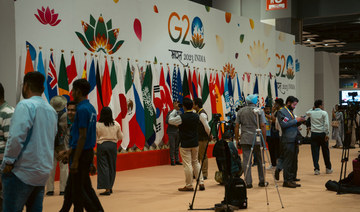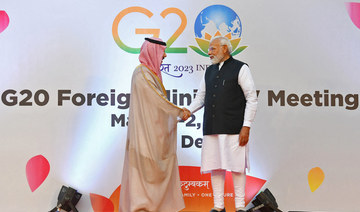NEW DELHI/WARSAW: Leaders of the world’s most important economies are converging on New Delhi for the annual G20 Summit beginning on Saturday.
The Indian capital has had a makeover, with colorful decorative plants, green posts, fountains, sculptures, new streetlights and illuminated logos of India’s G20 presidency visible all the way from the international airport to the city’s center and around the main meeting venues.
Parts of the metropolis of 33 million people also went quiet as some of the main roads were shut and 130,000 security personnel were deployed to guard the event.
But what is the G20, why is this year’s summit important, and what should we expect from it?
The group of the world’s 20 major economies was established in the late 1990s, in the wake of the Asian financial crisis to address such events collectively.
Over the years, it has morphed into a forum for addressing urgent global problems such as food security, climate change and, since the 2021 Russian invasion of Ukraine, the global repercussions of the conflict.
Together, members of the G20 account for 85 percent of global economic output, 75 percent of international trade, and about 60 percent of the world’s population.

The group’s members are 19 countries — Argentina, Australia, Brazil, Canada, China, France, Germany, India, Indonesia, Italy, Japan, Mexico, Russia, Saudi Arabia, South Africa, South Korea, Turkey, the UK, and the US — plus the European Union.
Every year, the group is led by a different member, which hosts its policy meetings and their culmination — the leaders’ summit. India took over the G20 presidency from Indonesia last year and will hand it over to Brazil.
FASTFACTS
The G20 was founded in 1999 in the wake of the 1997 Asian financial crisis as a forum for ministers and central bank governors to discuss global economic issues.
It was upgraded to the level of heads of state and government after the 2007/08 global financial crisis, becoming the premier forum for international economic cooperation.
In recent years, the bloc has faced divisions over trade, climate change and the war in Ukraine.
This year’s G20 Summit is the group’s 18th and India’s first as the host. It is the culmination of more than 200 meetings of G20 ministers, sherpas, and engagement groups, as well as side events and workshops that have taken place in more than two dozen cities across India.
Prime Minister Narendra Modi and his Cabinet made sure that G20 meetings were visible, resonated across the country and were widely followed at home and abroad, in what became a campaign to establish India’s image as a global power.

Security personnel stand guard near a G20 communication billboard with the portrait of Indian Prime Minister Narendra Modi inside the international media center at the G20 venue days ahead of its commencement in New Delhi on September 7, 2023. (AFP)
“India has lavished more attention on the G20 than any other host country in the past. This obviously means that all the main events are more high profile and are likely to generate good press for India,” Aditya Ramanathan, a research analyst at the public policy center Takshashila Institution in Bangalore, told Arab News.
The summit — coming right after India’s successful moon landing and last week’s launch of its first solar mission — would be expected to crown all the branding efforts, but how successful it is going to be does not depend on India alone.
“The G20 is much more divided today than it was a few years ago,” Ramanathan said.
“Global politics has changed dramatically since 2020 because of three factors: the pandemic, the Russia-Ukraine war, and China’s worsening ties with several countries.”
ALSO READ:
• G20 gathers in India with Xi absent
• EU’s Michel says it is hard to predict if G20 can agree on summit declaration
China’s relations are frosty not only with the US, but also with India, with which tensions have flared sporadically along their Himalayan border for the past three years.
After Russian President Vladimir Putin, Chinese President Xi Jinping was the second head of state to signal his absence at the summit. But while Putin also skipped the G20 Summit in Indonesia last year — in the wake of tensions over the Russian invasion of Ukraine — this will be the first time a Chinese leader has missed a summit since the first meeting in 2008.
“I don’t think that Xi Jinping’s decision to not attend is about the G20 per se,” said Manoj Kewalramani, a fellow in China studies at Takshashila Institution.
“It’s not like Beijing does not see value in the grouping. However, it does not want to be seen endorsing India as a leader of the Global South, which is how the Indian government has pitched its G20 presidency.”

In this photo taken on August 23, 2023, India's Prime Minister Narendra Modi China (2R) and China's President Xi Jinping (2L) are shown in a family photo with Brazil President Luiz Inacio Lula da Silva, South African President Cyril Ramaphosa, and Russian Foreign Minister Sergei Lavrov during the 2023 BRICS Summit n Johannesburg, South Africa, during which they positioned themselves as the principal voice for the emerging economies of the Global South. (Pool via REUTERS/File Photo)
India and China, the world’s two most populous nations, have been competing to position themselves as the principal voice for the emerging economies of the Global South — that is, countries mostly in the Southern Hemisphere, and largely in Africa, Asia and Latin America, which until recently have often been described as developing or less developed.
India has used the world’s premier forum for economic cooperation to present itself as playing a bridging role between these countries and the West.
During last month’s summit of the B20 — the official G20 dialogue forum for the global business community — India’s Foreign Minister S. Jaishankar said that “the core mandate of the G20 is to promote economic growth and development and that cannot advance if the crucial concerns of the Global South are not addressed.”

India’s Foreign Minister S. Jaishankar. (SUPPLIED)
Under India’s presidency, many meetings revolved around problems that plague the Global South, like reform of the international debt architecture and the impact of geopolitical uncertainties on access to food and energy.
India has also pledged that as G20 chair it would prioritize addressing the climate crisis, including the financing of response to climate change, developing green technologies, and a just energy transition.
During the G20 summit, world leaders will address what in general is referred to as key problems affecting the stability of the global market.
Some of the other issues up for agreement are green development, which includes climate finance, accessible digital public infrastructure, and augmenting renewable energy sources, as well as a global plan to improve sustainable agriculture and food security.
But will they achieve consensus?

Saudi Arabia’s assistant culture minister Rakan bin Ibrahim Al-Tawq represented the Kingdom at the G20 Culture Ministers' Meeting in Varanasi in India on Saturday. (SPA file)
The ultimate goal of the G20 forum is to formulate a joint statement and the ongoing war in Ukraine is likely to affect that. In the communique, the leaders will have to explain, for example, why the world is facing food and energy insecurity and high inflation.
However, during the ministerial meetings held throughout the year, G20 countries could not reach an agreement on what has caused this situation.
Western countries blame the crisis on Russia’s invasion of the world’s breadbasket, Ukraine, and some, including the US, France and Canada, have signaled that they would refuse to sign any joint declaration that does not condemn it.
If the leaders fail to achieve consensus, it would be the first time since the bloc’s founding that a summit would end without a joint communique. In that case, India, as the host country, will have to produce a statement summarizing the points the countries agreed on as well as the divergences.
“The G20 summit is taking place at a time when the world is impacted by the Ukraine war, and India represents the bridge between two extreme views,” said Sanjay Kapoor, analyst and chief editor of the political magazine Hard News.
“It’s a difficult summit to hold at this juncture. Though it has possibilities, the challenge would be to build a consensus around the core issues. The ministerial meetings haven’t yielded much in that direction.”





























